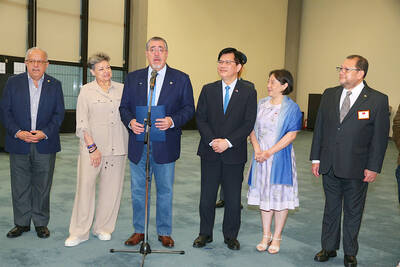A study conducted by Taiwanese researchers suggests that the reason newborns are more susceptible than adults to influenza is because their natural killer (NK) cells, a component of the innate immune system, are easily compromised by flu viruses.
“We found that infants’ NK cells — the body’s natural weapon against flu — are very vulnerable to the flu virus,” Lin Syh-jae (林思偕), a doctor at Chang Gung Children’s Hospital and the leader of the research team, said at a press conference yesterday.
“Not only do infants’ NK cells die out faster than adult ones, their functions become compromised through the process of infection,” he said, adding that NK cells perform equally well in newborns and adults prior to any flu infection.
In research conducted over the past three years, Lin first derived NK cells from fresh umbilical cord blood, injected influenza A viruses into the cells and studied the infection mechanism. To counter the flu infection process, Lin introduced interleukin-15, an immune hormone, and found that it could effectively increase NK cells’ anti-viral function.
“There is a possibility that interleukin-15 could be used in the future to treat children with serious influenza complications,” he said.
Kuo Ming-ling (郭敏玲), a professor at Chang Gung University’s Graduate Institute of Biomedical Sciences and a team member, said the more scientists know about the human immune system, the better chances they have of finding ways to prevent the onset of diseases.
“Our findings can serve as useful references for the health food industry because they might want to probe the efficiency of adding interleukin-15 to their food supplements,” Kuo said. “The relationship between children’s NK cells and influenza infection is a very new topic.”
The study was published in the March edition of the Journal of Infectious Diseases.

Greenpeace yesterday said that it is to appeal a decision last month by the Taipei High Administrative Court to dismiss its 2021 lawsuit against the Ministry of Economic Affairs over “loose” regulations governing major corporate electricity consumers. The climate-related lawsuit — the first of its kind in Taiwan — sought to require the government to enforce higher green energy thresholds on major corporations to reduce emissions in light of climate change and an uptick in extreme weather. The suit, filed by Greenpeace East Asia, the Environmental Jurists Association and four individual plaintiffs, was dismissed on May 8 following four years of litigation. The

A former officer in China’s People’s Liberation Army (PLA) who witnessed the aftermath of the 1989 Tiananmen Square massacre has warned that Taiwan could face a similar fate if China attempts to unify the country by force. Li Xiaoming (李曉明), who was deployed to Beijing as a junior officer during the crackdown, said Taiwanese people should study the massacre carefully, because it offers a glimpse of what Beijing is willing to do to suppress dissent. “What happened in Tiananmen Square could happen in Taiwan too,” Li told CNA in a May 22 interview, ahead of the massacre’s 36th anniversary. “If Taiwanese students or

DIPLOMACY: It is Guatemalan President Bernardo Arevalo’s first visit to Taiwan since he took office last year, while Eswatini’s foreign minister is also paying a visit A delegation led by Guatemalan President Bernardo Arevalo arrived in Taiwan yesterday afternoon and is to visit President William Lai (賴清德) today. The delegation arrived at Taiwan Taoyuan International Airport at 4:55pm, and was greeted by Minister of Foreign Affairs Lin Chia-lung (林佳龍). It is Arevalo’s first trip to Taiwan since he took office last year, and following the visit, he is to travel to Japan to celebrate the 90th anniversary of diplomatic relations between the two countries. Arevalo said at the airport that he is very glad to make the visit to Taiwan, adding that he brings an important message of responsibility

About 3,000 people gathered at events in Taipei yesterday for an annual candlelight vigil commemorating the 1989 Tiananmen Square Massacre, a brutal crackdown by Chinese authorities on a student-led demonstration in Beijing on June 4 36 years ago. A candlelight vigil organized by the New School for Democracy and other human rights groups began at 7pm on Democracy Boulevard outside Chiang Kai-shek Memorial Hall, with the theme "Resist Transnational Repression, Defy Totalitarianism." At about 8pm, organizers announced that about 3,000 people had attended the event, which featured brief speeches by human rights advocates from Taiwan and China, including Hong Kong, as well